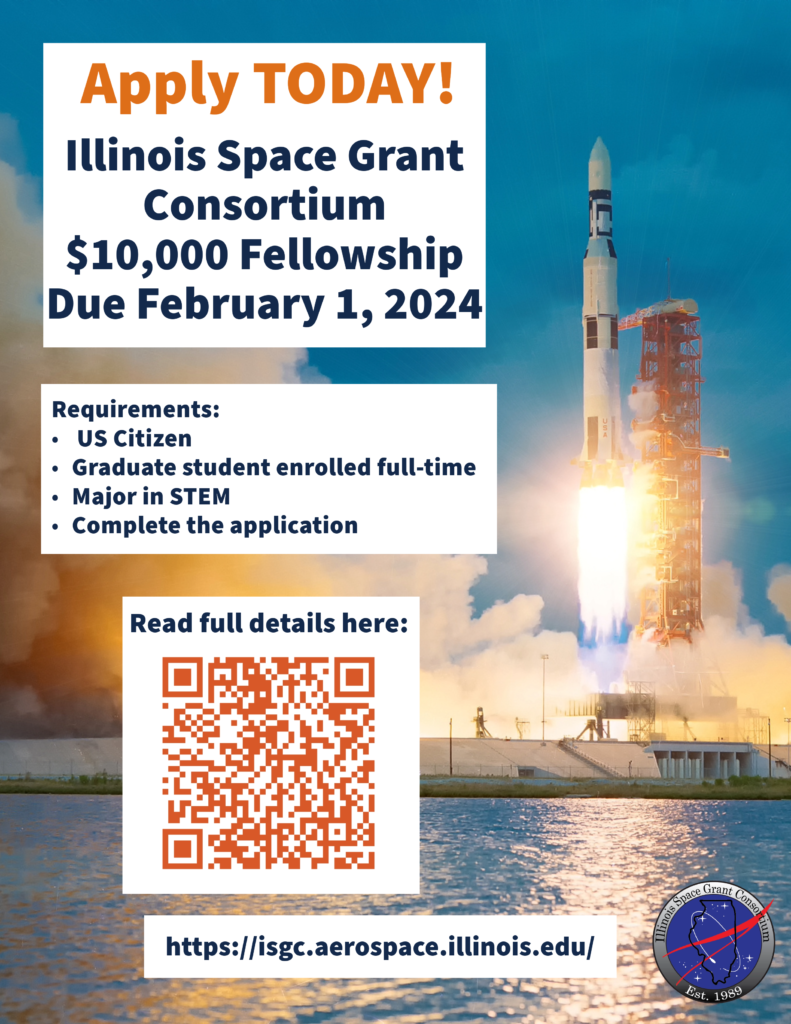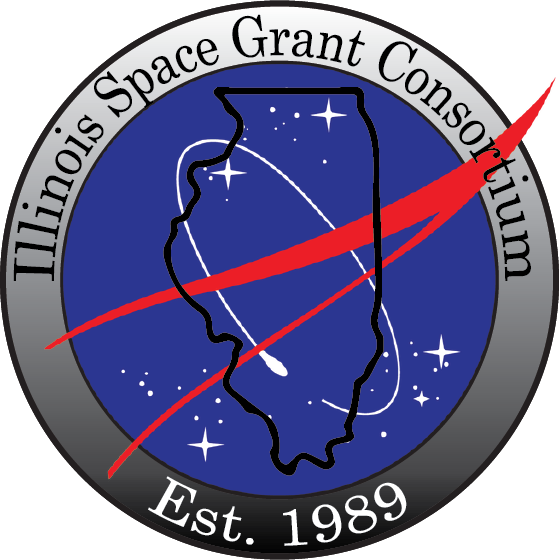Application opens: November 1, 2023
Application closes: February 1, 2024
Purpose:
The Illinois Space Grant Consortium (ILSGC) will award fellowships to outstanding students pursuing a graduate degree in Science, Technology, Engineering, and Math (STEM) disciplines that support NASA’s mission.
Awards:
Up to (10) $10,000 fellowships will be awarded for the 2023-2024 academic year.
Funding will be released incumbent upon authorization of funds by NASA.
Requirements:
- U.S. citizen
- Must be enrolled full-time at an ISGC affiliate institution:
- Bradley University
- Chicago State University
- City Colleges of Chicago
- DePaul University
- Illinois Institute of Technology
- Northern Illinois University
- Northwestern University
- Southern Illinois University Edwardsville
- The University of Chicago
- University of Illinois at Chicago
- University of Illinois at Urbana-Champaign
- Must be a full-time graduate student in Fall 2024 and Spring 2025
- Full-time student majoring in a STEM area, including, but not limited to: engineering, computer science, the biological and life sciences, chemistry, geological sciences, physics, and astronomy. We are specifically interested in students whose academic major and career goals are relevant to NASA.
- Good academic standing
- Students may only receive this funding twice during their degree
- Completed application
- All application materials must be submitted electronically by February 1, 2024, 11:59 pm.
Award winners will be chosen based on student qualifications and applications. Women, underrepresented minorities, persons with disabilities, and U.S. military veterans are encouraged to apply.
Application Instructions
Complete the Fellowship Application. As part of the application, you will be asked to upload the following:
- A one to two-page Statement of Interest should include:
- Your reasons for seeking this fellowship.
- Evidence of your previous and current interest/experience in engineering or science related to NASA interests.
- Connection to one of NASA’s Mission Directorates
- A current resumé.
- A copy of your most recent college transcript (can be an unofficial transcript).
- Provide one academic reference, which should include full contact information of the reference (name, address, position, institution, email, phone, etc.).
- ISGC will contact the reference for a letter of recommendation if needed. A letter of reference is not needed with your application.

NASA Mission Directorates
(These may help you identify where your research connects to NASA’s goals.)
Aeronautics Research
NASA’s Aeronautics Research Mission Directorate works to solve the challenges in our nation’s air transportation system: air traffic congestion, safety, and environmental impacts.
Space Operations Mission Directorate
Space Operations Mission Directorate will oversee mature human spaceflight programs, such as the International Space Station and commercial crew and cargo missions. The operations directorate is also in charge of NASA’s efforts to commercialize low Earth orbit, an objective the agency hopes will lead to privately owned space stations.
Exploration Systems Development Mission Directorate
Exploration Systems Development Mission Directorate will manage NASA’s Artemis moon program, including the Space Launch System heavy-lift rocket, the Orion spacecraft, and the Human Landing System, the spacecraft that will carry astronauts to and from the lunar surface.
Science
NASA’s Science Mission Directorate and the nation’s science community use space observatories to conduct scientific studies of the Earth from space to visit and return samples from other bodies in the solar system and to peer out into our Galaxy and beyond.
Space Technology
The Space Technology Mission Directorate is responsible for developing the crosscutting, pioneering, new technologies and capabilities needed to achieve NASA’s current and future missions.
Please visit each NASA organization’s website to find detailed information about current projects and current areas of interest.
For more information detailing the five mission directorates, visit:
http://www.nasa.gov/offices/education/missions/gen_overview.html
Selection
Fellowships will be awarded to students who have the highest academic merit and have submitted a transcript and a complete application.
Awardees must complete the following before their funding will be established:
- Sign and return their award letters by the deadlines provided.
- Create an account on the NASA gateway system.
- Awardees agree to participate in the NASA longitudinal tracking process. This involves requesting information from recipients to determine whether Space Grant-funded opportunities impact a student’s future education/career plans. All awardees must agree to provide timely information for this report. The data is used to demonstrate the success of the Space Grant program to NASA so that funding will continue to be appropriated for future students. The tracking occurs through the first year of your next step. For example, if you take two years to complete your graduate degree, we will ask for your information yearly until you enter a post-graduate school or take a position in your career field.
Failing to meet the above criteria will cancel the award, and the student will receive a rescind letter.
Provided candidates meet minimum eligibility requirements, at least one applicant from each affiliate institution will be awarded a scholarship/ fellowship. Acceptance of this award may impact a student’s income level to a degree that could affect eligibility for other funding – including student loans. It is the student’s responsibility to consult with their undergraduate student office and their campus financial aid advisors. ISGC encourages students to meet with their financial aid officers before application submission.
Illinois Space Grant Fellowships cannot be concurrently accepted or combined with support from other individual federal graduate fellowships. Federal graduate fellowships are defined as awards for which the applicant applies as an individual, not as part of a program.
Examples from the US Government include, but are not limited to, individual federal fellowship programs offered by the National Science Foundation, Department of Agriculture, Department of Defense, Department of Energy, Department of State (Fulbright fellowships), Environmental Protection Agency, National Aeronautics and Space Administration, National Institutes of Health, and National Oceanic and Atmospheric Administration to support the graduate education of individuals.
Deadline and Notification of Awards
| Submission Deadline: |
|---|
| February 1, 2024 11:59 PM |
After screening for eligibility, successful applicants will be notified by the ISGC and affiliate institution. Notifications will also be sent to the affiliate institution.
Timeline
- November 1, 2023 – Application Opens
- February 1, 2024 – Application Closes
- February– March 2024 – Selection Process occurs
- By March 31, 2024 – Notification to awardees
- May 1, 2024 – Awardees must accept by this date and complete the expectations listed above.
- Fall 2023 and Spring 2024– Your institution will disperse the payment according to their policies.*
* Funding will be released upon authorization of funds by NASA, and the affiliate subaward is in place.
